Honoring retiring faculty
REXFORD ANNO-NYAKO AHENE
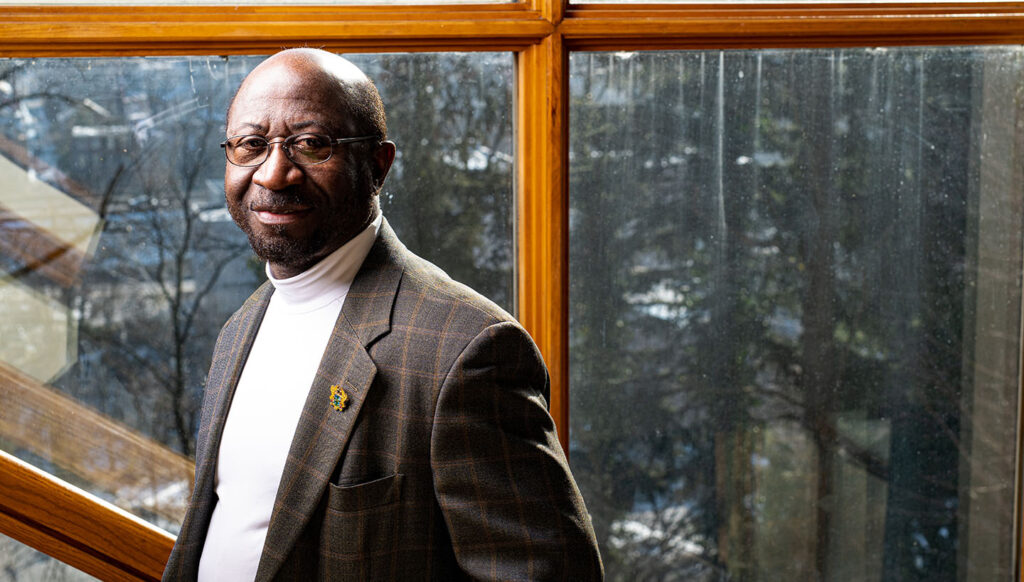 REXFORD ANNO-NYAKO AHENE, professor of economics, has been a member of the faculty for 40 years.
REXFORD ANNO-NYAKO AHENE, professor of economics, has been a member of the faculty for 40 years.
He earned a Bachelor of Science degree in land economy and estate management from University of Science and Technology in Kumasi, Ghana. He also holds two Master of Arts degrees: one in economics from Virginia State University and one in agricultural economics from University of Wisconsin-Madison. Ahene also earned a doctoral degree in economic development from University of Wisconsin-Madison. Ahene joined the faculty as assistant professor in 1982 and was promoted to associate professor with tenure in 1988 and full professor in 1996.
Ahene’s areas of research and consulting interest include economic development and institutional reforms in Africa, land policy, land administration reforms, land taxation and rating and valuation policy, privatization and real estate investment feasibility analysis, land resource economics, and urban and rural land markets. In addition to teaching courses in principles of economics, economic development, urban economics, multinational corporate strategic management, and real estate investment feasibility analysis at Lafayette, Ahene has delivered lectures at conferences in the United States, Ghana, Sierra Leone, and Finland, among other countries.
Ahene has authored a vast array of books, journal articles, professional papers, and commissioned government publications. He also is a member of the editorial boards for Land Tenure Journal, African Journal of Land Policy and Geospatial Sciences, and Journal of Black Studies.
The founding director of the Africana Studies program at Lafayette, Ahene was instrumental in the creation of the College’s dean for multicultural affairs and diversity issues position. He helped found the McDonogh Network, served as a faculty adviser to the Association of Black Collegians (ABC), chaired the Black Cultural Center Committee, and helped establish the Portlock Black Cultural Center, Office for Intercultural Affairs, Interim Program/Study Abroad in Africa, and Black Coalition.
A highly regarded scholar, Ahene serves as a policy adviser to many national governments, multilateral development institutions, academic institutions, and think tanks on how restructuring property and economic rights can redress the ill effects of colonialism and underdevelopment, especially in post-colonial countries throughout Africa.
He is the principal architect and author of land policies in Tanzania, Malawi, and Sierra Leone. Since 2006, Ahene has served as the senior technical adviser for designing and implementing digital land information systems for land administration reforms in Sub-Saharan Africa.
Ahene is the recipient of the United Nations Food and Agriculture Organization’s Certificate of Appreciation for Gender and Land Rights Training of Women as Trainers, Marquis Distinguished Teaching Award, Frederick Douglas Faculty Diversity Award, Daniel L. Golden Alumni Award, and Fulbright Curriculum and Capacity Development Award. He also is a member of the Lincoln Institute for Land Policies, American Economic Association, African Studies Association, International Institute of Rating and Valuation, and International Federation of Surveyors.
GARY P. GORDON
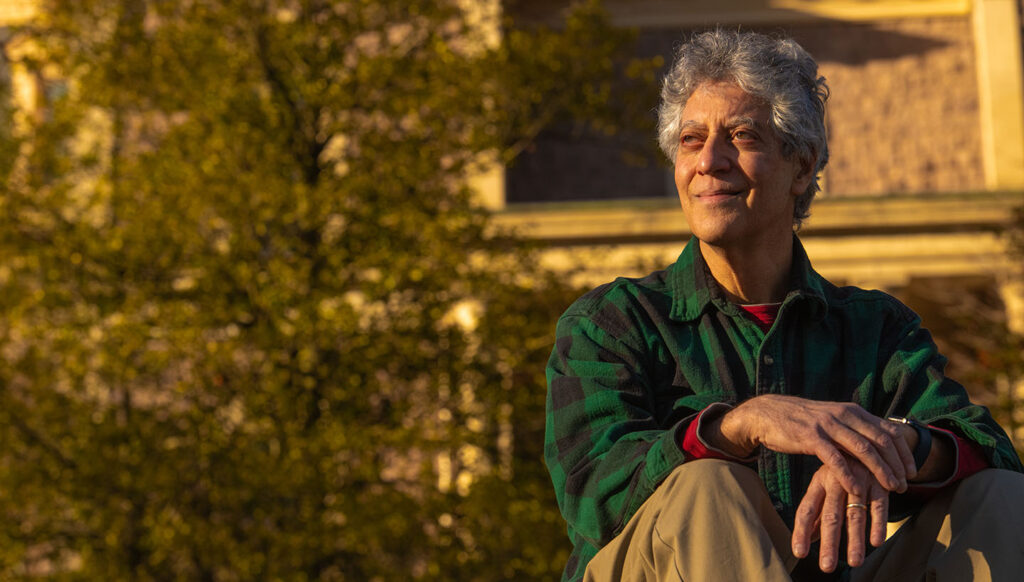 GARY P. GORDON, Marshall R. Metzgar Professor of Mathematics, has been a member of the faculty for 36 years.
GARY P. GORDON, Marshall R. Metzgar Professor of Mathematics, has been a member of the faculty for 36 years.
He earned a Bachelor of Arts degree in mathematics from University of Florida, as well as a doctoral degree in mathematics from University of North Carolina at Chapel Hill. Gordon joined the faculty as assistant professor in 1986 and was promoted to associate professor in 1991 and full professor in 2000. He served as head of the Mathematics Department from 2015 to 2018, as well as in fall 2013, spring 2015, and fall 2021.
In addition to teaching a wide variety of mathematics courses at all levels that served students across disciplines, Gordon taught two First-Year Seminars: one on the science of political polls and another on baseball, which led to his serving as the faculty mentor for Lafayette’s baseball team. Gordon also taught Controversies in Science in the College’s Values and Science/Technology (VAST) Program. He lectured in Argentina as a Fulbright specialist in 2015, and has delivered lectures throughout the U.S., as well as in New Zealand, France, Spain, Canada, Belgium, England, and the Netherlands.
Gordon has co-authored two books: Matroid Theory: A Geometric Introduction and The Joy of SET: The Many Mathematical Dimensions of a Seemingly Simple Game, which he co-wrote with his wife, Elizabeth W. McMahon, and their two daughters. He also has written a vast array of peer-reviewed articles, 16 of which were written with student co-authors. One of those, “Pick a tree, any tree,” won the Halmos-Ford Award for Exposition. In addition, Gordon has served as a guest editor for the European Journal of Combinatorics, a Problem Section editor for Math Horizons, and a referee for a multitude of journals.
During his time at Lafayette, Gordon led the Research Experience for Undergraduates (REU) program from 2000 to 2010, was a mentor for the Posse Scholars program and the Lafayette Initiative for Malagasy Education (LIME) program, and was a co-adviser for the Hillel Society.
Gordon is the recipient of the Deborah and Franklin Tepper Haimo Award for Distinguished Teaching of College or University Mathematics, James P. Crawford EPaDel Section Award for Distinguished College or University Teaching, Mary Louise Van Artsdalen Prize, Marquis Distinguished Teaching Award, and James P. Crawford Award, among other honors.
THOMAS HILL
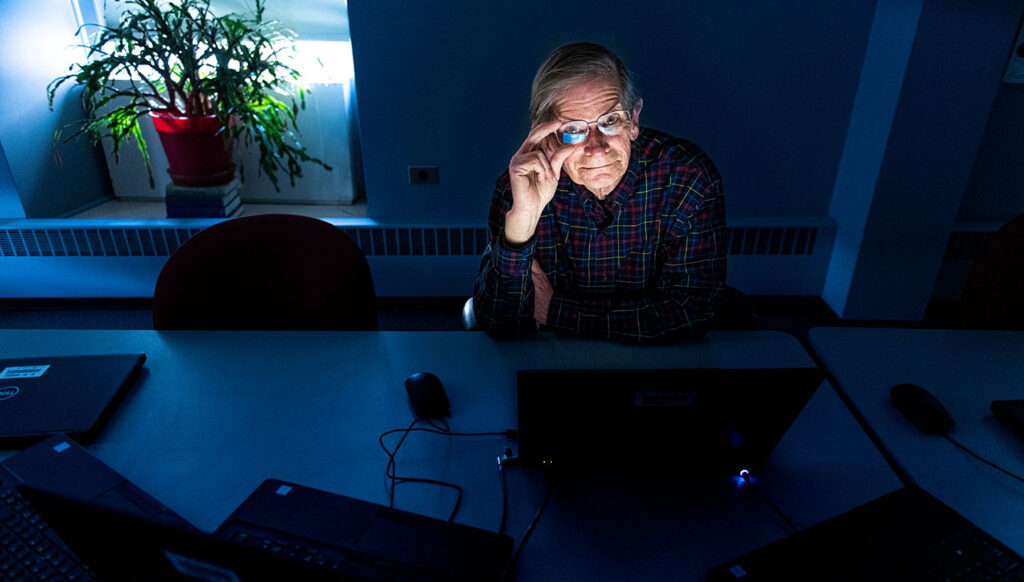 THOMAS HILL, professor of mathematics, has been a member of the faculty for 43 years.
THOMAS HILL, professor of mathematics, has been a member of the faculty for 43 years.
He earned a Bachelor of Science degree in Applied Mathematics from North Carolina State University, as well as a doctoral degree in mathematics from University of Virginia. Hill joined the faculty as assistant professor in 1979 and was promoted to associate professor in 1985 and full professor in 2003. He served as head of the Mathematics Department from 1991 to 2000.
In addition to teaching courses at all levels of the mathematics curriculum, Hill taught the First-Year Seminar on Encounters with Infinity and has delivered lectures at conferences throughout the United States. His areas of research interest include differential equations and real, complex, and functional analysis. He has authored several scholarly articles that have been published in journals such as Integral Equations and Operator Theory, Mathematica Journal, and UMAP Journal.
Hill’s focus on providing enriching experiences for his students was a consistent theme throughout his tenure at Lafayette. He was instrumental in developing and shepherding the growth of the joint major in mathematics and economics, contributed to the College’s transition to its current 4/4 curriculum, and led the department’s summer orientation efforts to place incoming students in appropriate mathematics courses.
Hill spent his first sabbatical year at Harvey Mudd College working with a group of students in its Mathematics Clinic. During that leave, he developed the course Case Studies in Mathematical Modeling—the first course with an explicit focus on mathematical modeling offered at Lafayette—and learned to use an early computer algebra system, an experience that contributed to his interest in providing computer laboratory experiences for Lafayette students. That interest led to a successful application for National Science Foundation (NSF) support for the department’s first computer laboratory and contributed to the growth in the department’s use of computational tools. Those developments have helped Lafayette students develop a broader and deeper understanding of mathematics, and have given them tools they can use to integrate graphical and numerical methods with symbolic manipulation to become better problem solvers.
Hill is a recipient of the Wolfram Research Educational Grant, which helped provide software for the calculus laboratory, as well as two additional grants for exploration of methods to build stronger connections between mathematics and engineering.
EDWARD J. KERNS, JR.
 EDWARD J. KERNS, JR., Eugene H. Clapp II Professor of Art, has been a member of the faculty for 42 years.
EDWARD J. KERNS, JR., Eugene H. Clapp II Professor of Art, has been a member of the faculty for 42 years.
He earned a Bachelor of Fine Arts from Richmond Professional Institute (now Virginia Commonwealth University), as well as a Master of Fine Arts from Maryland Institute College of Art. Kerns joined the faculty as associate professor in 1980, and he was promoted to full professor in 1986 and Eugene H. Clapp II Professor of Art in 1988, becoming the youngest person to hold an endowed chair in the College’s history. He has served as the head of the Department of Art from 1980 to 1988, 1996 to 1999, and 2019 to 2022. Kerns also served as the founding director of the Williams Visual Arts Building from 2000 to 2007.
In addition to teaching a wide variety of art courses at all levels, Kerns engaged in collaborative teaching and groundbreaking research partnerships with neuroscientists, biologists, computer scientists, and civil, mechanical, and chemical engineers, and he advised a number of honors students not only in the Art Department, but also in the Biology, English, and Neuroscience departments.
Kerns was an established American abstract expressionist working in Manhattan when he was hired by Lafayette College to chair and build a modern-era Art Department. An internationally recognized painter, Kerns led the effort to establish the Williams Arts Campus, home to Lafayette’s studio arts program. Additionally, he led the planning for the establishment of the Williams Visual Arts Building and the downtown Arts Campus. His fundamental principles for these new educational enterprises were collaborative work with science and engineering, and working toward an intellectual, consilient unity of purpose. The last 15 years of his practice have been devoted to art and science collaborations, including the Octopus Meditations, Frankenstein2029 with Suzanne Westfall, and partnerships with consciousness study programs.
Since 1971, Kerns’ work has been seen in 42 one-person exhibits and over 130 group exhibitions. His works also are in numerous public and corporate collections, including those of the Aldrich Museum, AT&T Corporation, Chase Manhattan Bank, Citicorp Bank, Prudential Insurance Co., and more. In addition, Kerns has served on museum boards and advised art-driven economic development projects, and he has contributed to the publication of several exhibition catalogs.
Kerns is the recipient of two Lindback Awards as well as the Lennertz Award for Teaching, Crawford Award, Jones Award for Superior Teaching, Jones Faculty Award, and Mary Louise Van Arts Dalen Award for Superior Scholarship and Professional Activity. He has received numerous grants for support of his works. Kerns is currently a member of the Pennsylvania Arts Coalition, College Art Association, and National Association for Curricular Development, and he has previously served as a member of the National Council of Art Administrators and Pennsylvania State Council on the Arts. He also served as chairman of the board for the Karl Stirner Arts Trail from 2010 to 2016, a role to which he returned in 2020.
ELIZABETH W. MCMAHON
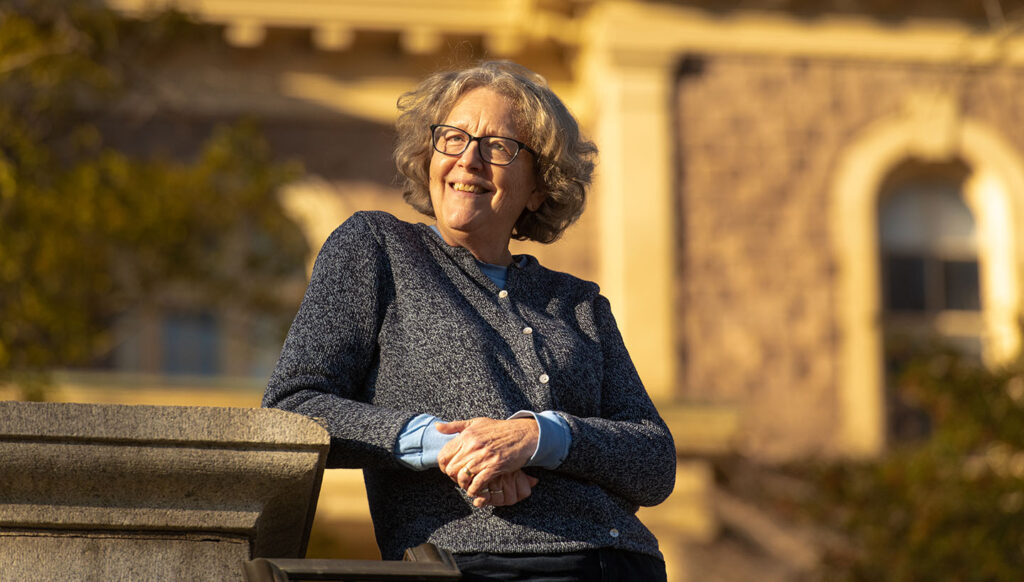 ELIZABETH W. MCMAHON, professor of mathematics, has been a member of the faculty for 36 years.
ELIZABETH W. MCMAHON, professor of mathematics, has been a member of the faculty for 36 years.
She earned a Bachelor of Arts in mathematics from Mount Holyoke College, a Master of Science in mathematics from University of Michigan, and a doctoral degree in mathematics from University of North Carolina at Chapel Hill. McMahon joined the faculty as assistant professor in 1986 and was promoted to associate professor in 1992 and full professor in 2000.
In addition to teaching a wide variety of math courses at all levels that served students across disciplines, McMahon taught several women’s studies courses, which helped students understand their own paths to STEM. She has delivered lectures in the United States, France, Germany, Belgium, Argentina, and Canada. McMahon’s areas of research interest include combinatorics, finite geometry, symmetry groups, and the card game SET.
McMahon has co-authored two books, including Teaching the Isms: Feminist Pedagogy Across the Disciplines and The Joy of SET: The Many Mathematical Dimensions of a Seemingly Simple Game, which she co-wrote with her husband, Gary Gordon, and their two daughters. She also has written a vast array of journal articles, and she has served as a referee and reviewer for various renowned journals.
During her time at Lafayette, McMahon served as a mentor for the Lafayette Initiative for Malagasy Education (LIME), Posse, and Project NExT, and as an adviser for the Hillel Society and the Lafayette chapter of Pi Mu Epsilon (National Mathematics Honor Society).
McMahon is the recipient of the Excellence in Diversity Education Award, James P. Crawford Award, Marquis Distinguished Teaching Award, and Mathematical Association of America EPaDel section James P. Crawford Award for Distinguished Teaching of Mathematics, among other honors. She is a member of the American Mathematical Society, Mathematical Association of America, Association of Women in Mathematics, and American Association of University Professors.
LARRY STOCKTON
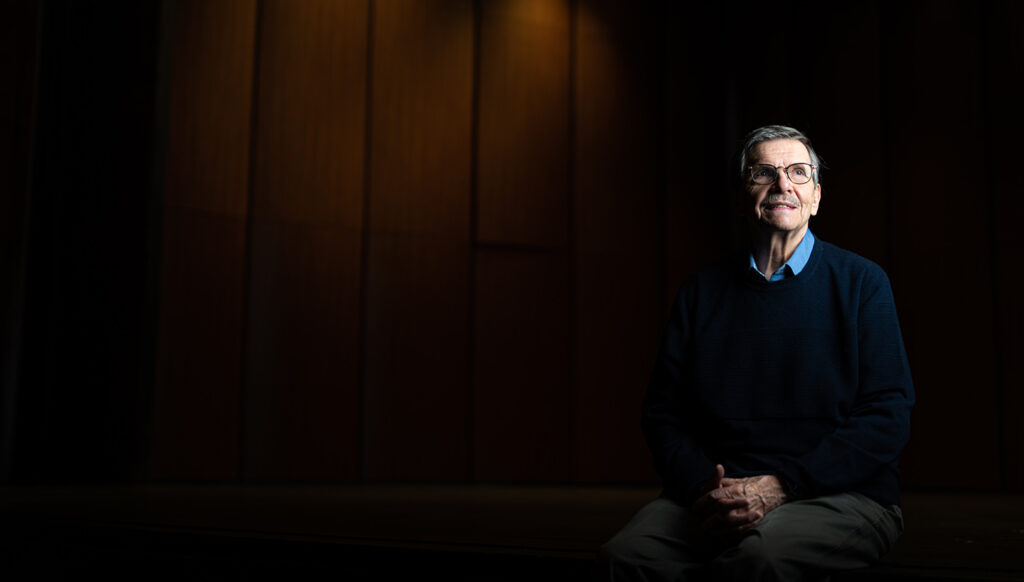 LARRY STOCKTON, professor of music, has been a member of the faculty for 45 years.
LARRY STOCKTON, professor of music, has been a member of the faculty for 45 years.
He earned a Bachelor of Science in music education and a Master of Music Education from Western Carolina University, as well as a Doctor of Musical Arts from Temple University. Stockton joined the faculty as an instructor and band director in 1977 and was promoted to associate professor in 1983 and full professor in 1996. He also served as head of the Music Department for 30 consecutive years, from 1992 to 2022.
His Lafayette career has included directing several musical ensembles (Marching Band, Concert Band, Jazz Ensemble, Pep Band, and Percussion Ensemble) and teaching a wide variety of courses in both western and non-western musical traditions. As a lifelong student and a performer of jazz, Stockton, along with his colleague and friend Prof. William Melin, developed an interim session course called the New York Jazz Experience, an offering that became somewhat legendary among Lafayette students over its 20-year run. The course was featured in a New York Times article on Jan. 20, 1997. In addition to these and other courses taught at Lafayette, Stockton taught his World Music Traditions course at Moravian University in numerous spring semesters, and accepted several LVAIC teaching assignments at Lehigh University and Muhlenberg College.
Since 2008, the Lafayette Percussion Ensemble has been Stockton’s major contribution to performance at Lafayette. He was honored by current students and returning alumni members in November 2021, performing to a sold-out audience.
After earning his doctorate in 1982, Stockton continued musical studies at University of Michigan under the guidance of renowned ethnomusicologist William Malm, followed by performance studies in the Japanese Kabuki Theater tradition with Denji Tanaka and Semba Kokun. This was the start of a lifelong engagement with Japanese music and culture, soon expanded to include musical studies in Ghana, Korea, and Indonesia. These undertakings resulted in the growth and development of courses in World Music Traditions (Music 103) and area studies in Japanese and West African music, offerings that became staples in Lafayette’s Music Department, with large enrollments each semester.
His musical background prior to arriving at Lafayette included three years performing with U.S. Army bands in Atlanta and Tokyo, serving as instructor of percussion studies at Western Carolina University and University of Delaware, and numerous freelance performances.
Stockton also has been active as a scholar and clinician, with numerous articles and conference presentations, and as a performer, most notably as a featured soloist with the Philadelphia-based Pennsy Pops Orchestra. In 1992, he collaborated with the Japanese recording company Toshiba-EMI to produce a series of concert band recordings included in the Masterpiece Series collection.
He is the recipient of the Korea Society Fellowship, Fulbright-Hays Fellowship, U.S. Army Showcase Award for Best Original Score, and Lafayette College Faculty Development Grant and Computer Grant, among other honors. He is a member of the Society for Ethnomusicology, College Band Directors National Association, Percussive Arts Society, National Association for Music Education, National Association of Jazz Educators, Asia Society, Japan Society, American Federation of Musicians, and Association for Asian Studies.
KARL A. SEELER
KARL A. SEELER, associate professor of Mechanical Engineering, has been a member of the faculty for 33 years.
He earned a Master’s of Science in both Civil and Mechanical Engineering and went on to get his Ph.D. in Mechanical Engineering, at Massachusetts Institute of Technology. Seeler joined the faculty at Lafayette in 1989 as an assistant professor, and received tenure and was promoted in 1995.
Professor Seeler is a conscientious professor committed to student learning. Known for his rigorous classes, Professor Seeler continuously improves his courses to maximize his students’ retention of the material and their understanding of underlying concepts as well as their ability to continue as lifelong learners.
As a scholar, Seeler published a book, System Dynamics, An Introduction for Mechanical Engineers and is undertaking a revision for a second edition. His scholarly expertise directly relates to his teaching, including the systems and controls course sequence at Lafayette.
Professor Seeler was instrumental in the manufacture of unique pieces of apparatus to equip a second teaching lab for the Controls Lab course. Professor Seeler served on the Curriculum and Educational Policy Committee, the Financial Policy Committee, and the Governance Committee.